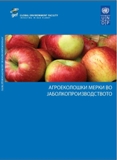Making a living
Economic development in the Prespa region is full of contrast, with three different countries with their own history and economic evolution. Average yearly income in Albania is estimated at US$700, in The Former Yugoslav Republic of Macedonia the average per capita income is approximately US$ 2,000, while on the Greek side it is estimated to be US$10,000. Unemployment in Prespa is high: approximately 12% in Greece, 23% in Albania and 32% in the The Former Yugoslav Republic of Macedonia.
Sustainable use of our common resource
The majority of the local population in the three countries is occupied in activities of the primary sector (agriculture, animal breeding, fishing, forestry). In Greece and in The Former Yugoslav Republic of Macedonia, intensive agriculture is the main occupation, complemented by animal husbandry and fishing. In Albania, human activities of the primary sector are extensive rather than intensive. Activities such as industry and manufacturing are developed only in the The Former Yugoslav Republic of Macedonia. Tourism is an important activity in Greece and the The Former Yugoslav Republic of Macedonia.
Livelihoods: Facts and Figures
According to the local experts’ estimations, 5% of the local population in the Macedonian part generates more than half of their incomes by gathering forest fruit, mushrooms and medicinal plants. Another 21% supplement their income by non-timber forest products. The importance of collecting wild fruits and medicinal plants for income generation in the Albanian part is similar.
Agriculture
The life in the Prespa Park revolves around agriculture that engages approximately 75% of work force, or up to 85% in Greece and Albania.
In the Greek part of the basin intensive bean cultivation is practiced on a total area of around 1000ha, while organic bean cultivation was introduced in 1998 and is being expanded since. Small land ownership (around 5ha per farm on average) and some significant deficiencies in marketing and processing also characterize the sector.
In the Albanian part of Prespa basin the arable land is covered mostly by wheat (84%), orchards (5%), and vineyards (3%). In the mid-1980s more than half of the arable soils were irrigated but, nowadays, only 2.1% of the arable land is irrigated due to the destruction of pumping stations. Each family owns approximately 1.4ha, but the productivity is low due to unfertile soils. The use of pesticides and fertilizers is considered very low, which indicates the area’s potential for organic farming.
In the The Former Yugoslav Republic of Macedonia agriculture generates some 30% of the total income. Approximately 20% out of 61,000 ha of the total area is agricultural land, dominated by apple growing. Orchards - including some traditional local varieties of both apples and pears - spread over 2,722 ha, with a production level of 50-60,000t. Wheat, and, to a lesser extent, barley (1300 ha) are the most dominant. There are 3000 agricultural families in the region, but 50% of the farmers today are over 55 years old.
Fishing
Fishing has provided a source of income for hundreds of years and still exists today, although at a much smaller scale. Unique traditional fishing methods and tools developed in the past centuries remain an important element of the local culture and tradition, but are being replaced with modern ones.
According to fragmented data it is estimated that 2-13% of the labour force is involved in fishing, and that approximately 50-60 fishermen across the Prespa Basin earn a significant portion of their income just from the high-value carp fishery.
There is no reliable data on fish yield in either country, but the
steady decrease in catches is attributed either to the increased stress
on the Lake’s ecosystems, or to the limited fishing effort due to the
lack of profitable markets, or both.
The Secondary Sector
In the Greek Prespa, there are a few workshops operating organized as family businesses and employing about 25 people. There are no secondary sector activities in the Albanian Prespa. In the The Former Yugoslav Republic of Macedonia, some 2500 persons are employed in various, often not prosperous, and mostly small enterprises.
Prespa Park for the Sustainable Economic and Social development
With a basin-wide productive system not balanced, the future development policy should focus on the promotion of structural changes by emphasizing activities of the primary and tertiary sectors where the area’s competitive advantages converge.
In view of the character and the particularities of the region, large-scale or intensive development initiatives (intensive agriculture, manufacture, industry, mining, mass tourism etc.) are often incompatible with the preservation of the values of the area.
The Prespa Park Coordination Committee initiates and oversees activities that support, among other things, sustainable tourism, alternative technology, renewable energy sources, improved infrastructure and new production methods. This approach is considered the most appropriate to facilitate the transition from intensive uses of natural resources to more sustainable ones.





 GEF IW:LEARN
GEF IW:LEARN